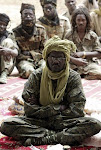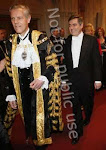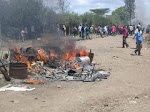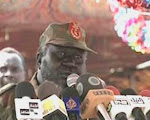Sen. John Kerry (Democratic Party), the Chairman of the United States (US) Foreign Relations Committee at the Senate, visited the Sudan on April 15th, 2009. He headed a US Fact-finding Congressional Mission to the Sudan. He was to review the progress of the Comprehensive Peace Agreement (CPA) and the Darfur Peace Agreement (DPA). Kerry's visit came immediately after a previous visit made by Gen. J. Scott Gration, appointed recently by President Obama as his Special Envoy to the Sudan.
Kerry is a former US army officer, who had volunteered to serve his country in Vietnam, because, as he later said in his own words: "it was the right thing to do." He believes in the notion that “to whom much is given, much is required”, (http://kerry.senate.gov/about/biography.cfm). Kerry is also known for his commitment to his country, the US. He worked as Committees' and Sub-committees’ Chairman at various levels. He is known for his tough commitment to regime change in the Sudan during the period of the Clinton and Bush Administrations. He had stated that: “Besides, an intervention against the Sudanese government would fit rather nicely within the contexts of the Terror War”, Kerry, (http://www.michaeltotten.com/archives/2004/07/kerry-stop-genocide-in-sudan.php).
While in Vietnam serving his country, especially in the midst of the battles, he had seen the lives of his fellow soldiers, his friends, put at risk because some leaders in Washington were making bad decisions. For his leadership, courage, and sacrifice under (enemy) fire, he was decorated with a Silver Star, a Bronze Star with Combat V, and three Purple Hearts,(http://kerry.senate.gov/about/biography.cfm).
Some news outlets like Reuters News Agency which followed Sen. Kerry’s visit to the Sudan, said President Al-Bashir’s response to Barack Obama’s overtures to the Islamic world was conciliatory. The statement also said that the Sudan viewed the US as an enemy in the past. “Kerry made his comments just days after Al-Bashir struck a more conciliatory tone towards Washington by welcoming US President Barack Obama's overtures to the Islamic world. Sudan has viewed the US in the past as an enemy,” (http://www.reuters.com/article/latestCrisis/idUSLH612957)
Alertnet.org and Reuters shared the same views. It appears that one of them quoted the other, so it seems. But according to Alertnet.org, “Kerry arrived just two days after Sudan's President, Omar Al-Bashir, struck a more conciliatory tone towards Washington, seen by Khartoum in the past as an enemy,” (http://www.alertnet.org/thenews/newsdesk/LG649073.htm).
Who in the current developing relations between Khartoum and Washington is really striking a more “conciliatory tone”, is it Khartoum or Washington? Is it true, therefore, that the Sudan had always viewed the US as an enemy? This article looks deeper into the developing relationship between Khartoum and Washington in a positive rather than a negative manner as was mentioned by Reuters and Alertnet.org.
First of all, there should be some responsibility in writing news pieces and a respect to what President Al-Bashir means in his statement. Welcoming Obama’s overtures to the Islamic world does not mean that President Al-Bashir was toning down. But as one of those Islamic leaders in the Arab and African worlds, the president had the right to react to Obama’s statement. The statement was general and Sudan, including other Islamic leaders, had the right to respond. Who then “struck a conciliatory tone”, is it Washington or Khartoum?
There's one thing that ought to be borne in mind, which needs to be accepted by everybody, including the news agencies as a fact that the Oboma Policy does not subscribe to confrontation. If it does, the policy would defeat the purpose of Oboma's Administration’s call for “ HYPERLINK "http://change.gov/" Change”; not only in the US context; but throughout the world. Obama’s non-confrontation policy seems to prefer negotiation with whoever believes that negotiation solves problems that were or are a reason for the conflict in the first place.
This is one of the US Administration's top Policy priorities as was mentioned in President Obama’s inaugural speech: “And so to all other peoples and governments who are watching today, from the grandest capitals to the small village where my father was born: Know that America is a friend of each nation and every man, woman and child who seek a future of peace and dignity, and that we are ready to lead once more, ” (http://www.cnn.com/2009/POLITICS/01/20/obama.politics).
A new 17-nation poll conducted for the BBC World Service finds widespread and growing optimism that Obama's presidency will lead to improved relations between the US and the rest of the world. In 15 of the 17 countries polled, majorities think that the election of Barack Obama will lead to improved relations with the rest of the world. On average 67 percent express this upbeat view, while 19 percent think relations will stay the same and just 5 percent (said) that relations will worsen, (http://www.worldpublicopinion.org/pipa/articles/views_on_countriesregions_bt/583.php).
It would then be reasonably sound to say that the appointment of US-Air Force Gen. J. Scott Gration as US Administration's Official Envoy to the Sudan was the first sign that points towards the implementation of the Obama non-confrontation policy. Choosing Gen. Gration for the job wasn’t just a coincidence. Gen. Gration was brought up in Africa by his missionary parents. Thus for the success of the policy implementation, it was wise for President Obama to appoint someone who understands Africa like Gen. Gration. For the benefit of the reader, it is appropriate to give a brief resume of Gen. Gration.
Gration grew up in the Democratic Republic of the Congo, where his parents worked as missionaries during the HYPERLINK "http://en.wikipedia.org/wiki/Congo_Crisis" \o "Congo Crisis" Congo Crisis in the early 1960s, his family was evacuated three times and became refugees. After his family returned to the US, he studied at Rutgers University, where he enlisted in the ROTC (Reserve Officers' Training Corps) programme and earned a Bachelor's Degree in Mechanical Engineering. After graduating he joined the United States Air Force in September 1974. He earned a Master's Degree in National Security Studies from Georgetown University in Washington in 1988, (http://en.wikipedia.org/wiki/Scott_Gration).
In his maiden speech as he assumed his official duty, Gen. Gration spoke to journalists in Khartoum. He said: "I come here with my hands open. It will be up to the Sudanese government to determine how they want to continue with the relationship. Hopefully it will be with hands of friendship and cooperation,," (http://www.rnw.nl/internationaljustice/icc/Sudan/090402-us-envoy-to-sudan). He said he had discussed with the government of National Unity (GONU), Darfur Administration and Government of South Sudan (GOSS) the progress of their administrations and the peace processes.
Sen. John Kerry as described in the second and third paragraphs of this article is the second sign of implementation of the Obama’s Policy of non-confrontation. Kerry’s delegation was quite representative of the US Administration's executive and legislative arms in the persons of Gen. Gration, President Obama's (White House Appointee) Special Envoy to the Sudan; and Sen. Kerry, US Senator and Chairman of the US Senate's Foreign Relations Committee, leading both Senate and Congress delegations. He confirmed to the press in the Sudan that he was heading the Congress and the Senate delegations: "Now it is my opportunity representing the US Congress and US Senate to be here to engage on humanitarian issues and obviously issues pertaining to the conflict", (http://www.reuters.com/article/latestCrisis/idUSLH612957).
In addition to these signs of implementation to the Obama’s non-confrontation policy, the tone of the US Administration as observed from the two envoys was and remains to be friendly – toned down – so to speak. The aggression witnessed during the Clinton through to the Bush Administrations is none existent. More so, there is a call from these US envoys for the improvement of the 'bilateral' relationship between Washington and Khartoum.
Strategically and in no uncertain terms, what seems to be happening is that the US Administration is implementing parts of its policies in the African and Arab continents. The US Administration, GONU, GOSS and Darfur Transitional Authority seem to be embarking on a serious effort aimed at implementing the CPA, DPA and new agreement with the Darfur rebel non-signatories to the DPA, as well as working out possibilities of normalizing full diplomatic relationship between Khartoum and Washington. This message was very clearly given to the Sudanese people by Gen. Gration: "The US and Sudan want to be partners, and so we are looking for opportunities for us to build stronger bilateral relations", Gen. Gration, (http://www.rnw.nl/internationaljustice/icc/Sudan/090402-us-envoy-to-sudan).
These relations (US-Sudanese) were severed immediately after the introduction of Shari'ah Islamic Laws (which were popularly known as September Laws) and followed by the SPLM/A rebellion in the country in 1983 and later in 1997. To query why the relations are needed now by both parties? One would speculate an answer that it could be a matter of both countries’ strategic interests.
For Sudan's strategic interests, however, recognition of the Sudan by the US as an effective member of the international community and removal of its name from the list of countries that Washington alleges sponsor terrorism would be a mere addition to its many successes. It is understood in international politics that what the US supports, is usually, but not always, supported by the North Atlantic Treaty Organisation (NATO). The US normally commands NATO-led International Security Assistance Force (ISAF). In the recent past, "the NATO Secretary-General and the Supreme Allied Commander Europe welcomed the nomination by President Bush of General David D McKiernan as the next commander of the NATO-led ISAF," (http://www.nato.int/docu/update/2008/01-january/e0118b.html).
Sudan has the oil and other precious natural and mineral resources and would need the World Trade Organization (WTO) through the NATO to have some of its products sold in the NATO markets. It would also mean that the European Union (EU) could become an automatic partner in such a business process because its citizens are the majority in the NATO alliance.
As for the US Administration, the Sudan is a strategically located country and that is of great interest to the US and its allies. Sudan is a bridge between Africa and the Arab world. It is in the US interest to renew friendship with the Sudan and avoid many complications, including a belief of the US previous administrations that the Sudan was dangerous terrorist country. The US Administration could gain from the many natural resources that the Sudan is endowed with but only through a non-confrontation policy like the one adopted by the Obama Administration.
The US is known to have a reservoir of oil that cannot be used unless sanctioned by an order from the top Administration. In other words, the oil to the US is an important strategic item. Sudan has other natural and mineral resources which the US Administration would be interested in. Sudan's strategic location that borders Nine (9) African countries is an interest to the US. The Great Lakes region from where many streams drain into and thus producing Lake Victoria and River Nile in the Sudan, which is one of the fewest sources of clean drinking water in the world, ought to be a long-term strategic interest of any country let alone the US because water is life. A columnist stated in The Citizen Newspaper that: "Specialists are anticipating disputes to arise over water sources in the world because of population increase that is unmet by a similar increase in those sources", (Economic Viewpoint Column by Muhammad Rashad, The Citizen Newspaper, May 3rd, 2009, p.11).
In short, the two countries have more than one reason to becomes friends and maintain such friendship for the interest of their peoples. But there are so many things this author as a Sudanese citizen has to say for bilateral relations between the Sudan and other countries to thrive.
The Sudanese peoples from all parts of their vast nation are known for their kindness and respect for foreigners. This kindness and respect should not be misunderstood for weakness and stooping low. It is true that the Sudan has had its internal civil wars. It is also true that these civil wars have been reduced to only one area instead of three areas of South Sudan, Eastern Sudan and Darfur. This wasn't simple and certainly going to bring peace to Darfur isn't simpler either. But peace in Darfur should be brought about by the Sudanese themselves and not through some kind of pressures from anybody outside the nation's borders.
There are international and regional treaties of which the Sudan is a signatory except a few like the Rome treaty which gave birth to the International Criminal Court (ICC). Sudan, as obligated by the International Law, has the right to use all the articles mentioned in the United Nations (UN) Charter meant to guide diplomatic relationships between states and non-interference in the internal affairs of any state.
Sudan as a country and its people – in the definition of the UN – is a member state of the UN. Being a member state of the UN means that what applies to all other member states applies to it without exception. But whenever bias of any kind is spotted, there's every reason for the Sudan and indeed any other country to react to that particular bias.
The Sudan is not an enemy of anybody as stated by Reuters and Alertnet.org; it doesn't choose to be anybody's enemy. What brought about bad relationship between the Sudan and the NATO/EU is the fact that the government of the Sudan is accused of killing people and fueling the wars in South, East and Western Sudan. The NATO/EU did not cross check some of the reports they receive from either their missions or International NGOs working in Darfur and South Sudan. Some of these reports were biased. Thus, some of these missions and NGOs have taken sides in the civil wars in the Sudan and as such made bad reports on the Sudanese government to the NATO/EU alliances.
Sen. Kerry said that: "in the midst of the battle while serving his country in Vietnam, he had seen the lives of his fellow soldiers, his friends, put at risk because some leaders in Washington were making bad decisions," (http://kerry.senate.gov/about/biography.cfm). The Sudan is a victim of those kinds of bad decisions based on bad reports filed to the UN by humanitarian organizations working in the Sudan and other Western countries represented in the NATO/EU alliances.
Why were some leaders in Washington making bad decisions, according to Sen. Kerry? The answer to this question is simple: the reports on how the US forces were fairing on in their war against the people of Vietnam were bad or biased. Thus the “ Change” mission President Obama came for is to ensure that no bad decisions in Washington were made. The Change” seems to be comprehensive and will certainly include making sure that good reports were used for good decision-making so that no American serving his country at home or abroad, traveling around the world or just staying at home fell victim of bad reports again. It should clearly be understood then that bad reports on any situation would always lead to bad decisions made by the governments that entirely rely on such reports.
Gen. Gration is reported by the media to have made his second visit to the Sudan. This is yet another sign which clearly shows that Washington is serious about making “partnership” with Khartoum in what seem to be common interest: Darfur peace process, the CPA implementation and a possible normalization of diplomatic relations between Washington and Khartoum. Gen. Gration’s mission and GONU’s readiness to renew friendship with Washington are steps towards the right direction so long as they are based on Obama’s non-confrontation Policy.
One last thing to mention is that there is hope that the US Administration remembers the fact that the Sudan has many political parties. Therefore, the US Administration should improve its relations with all the political parties in the Sudan. Besides, the US Administration could support Sudan’s efforts to hold elections and support the Sudanese peoples in their efforts to transform into a democracy. But trying to maintain relationship with some political parties in the Sudan, pitting others against the government and totally ignoring others, the US Administration would be trying to wade along the watery or muddy path of its predecessor. To seek for “partnership” with the government of Sudan is seeking for “partnership” with the Sudanese people.
Sen. John Kerry’s statement “on Friday, April 17th, 2009, that the ICC war crimes charges against Sudanese President Omar Hasan Al-Bashir should not stop efforts to resolve the Darfur conflict” (http://www.reuters.com/article/latestCrisis/idUSLH612957). should be ignored and regarded as hangovers from the previous US regimes. It is not possible for a country like the US – which properly understands the meaning of collision of peace and justice – to fail seeing how the ICC war crimes charges against President Al-Bashir would not just affect but seriously damage the Darfur peace process and the CPA implementation. The US refused to ratify the Rome treaty because they don’t want American citizens to be subjected to such a court. Why, does it really mean that the US is prone to injustice? No judgment! But there are people in the US who have committed more crimes than ICC thinks President Al-Bashir did.






